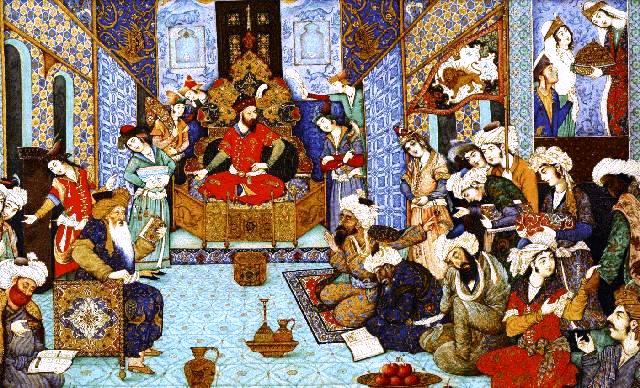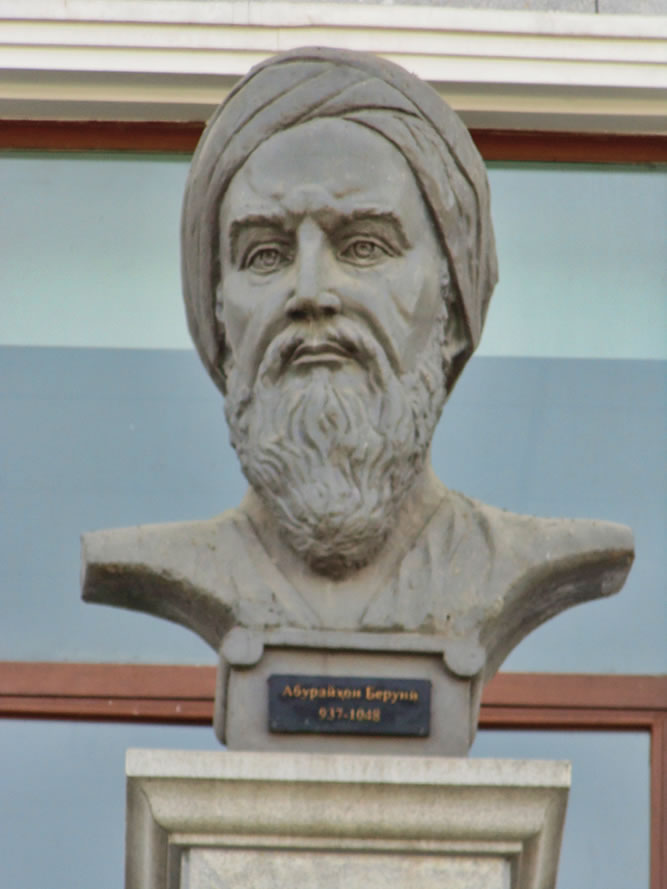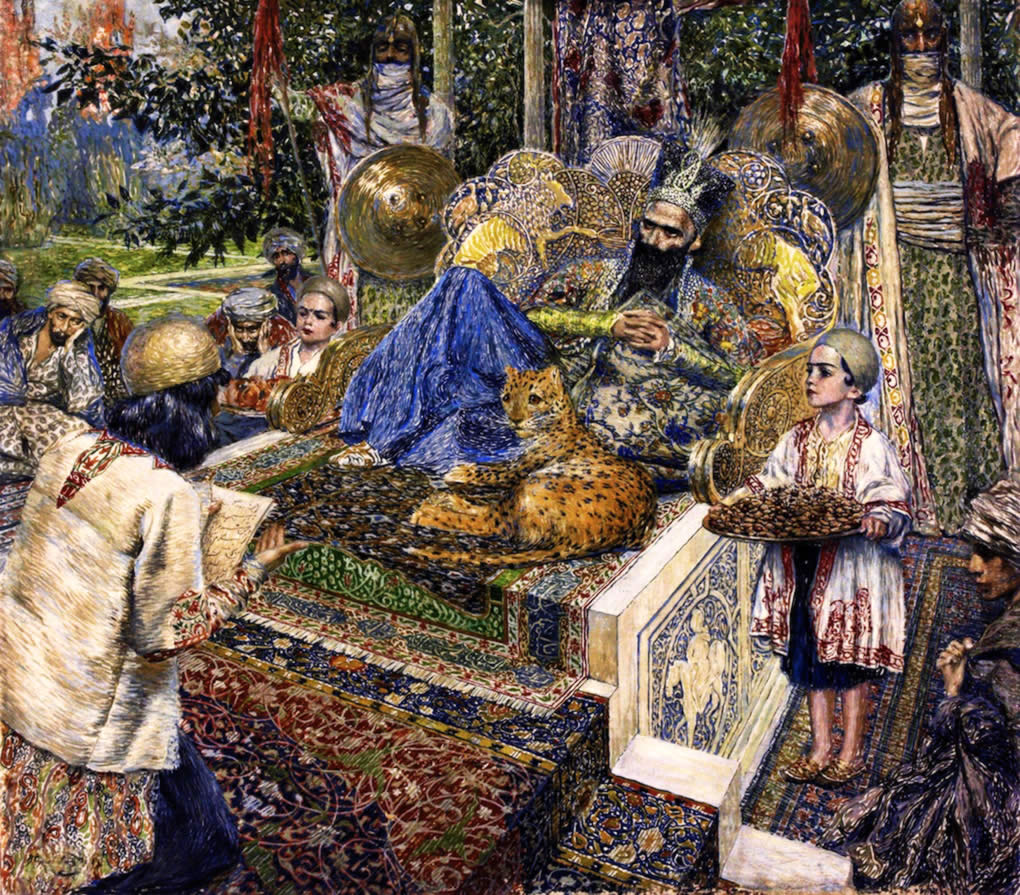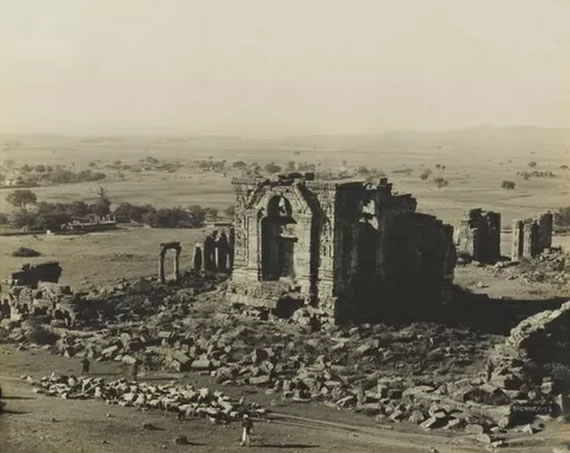Al-Biruni and Mahmud of Ghazni
editing: bh. Jan
The following is a series of emails from my private astrology forum that took place in March 1994.
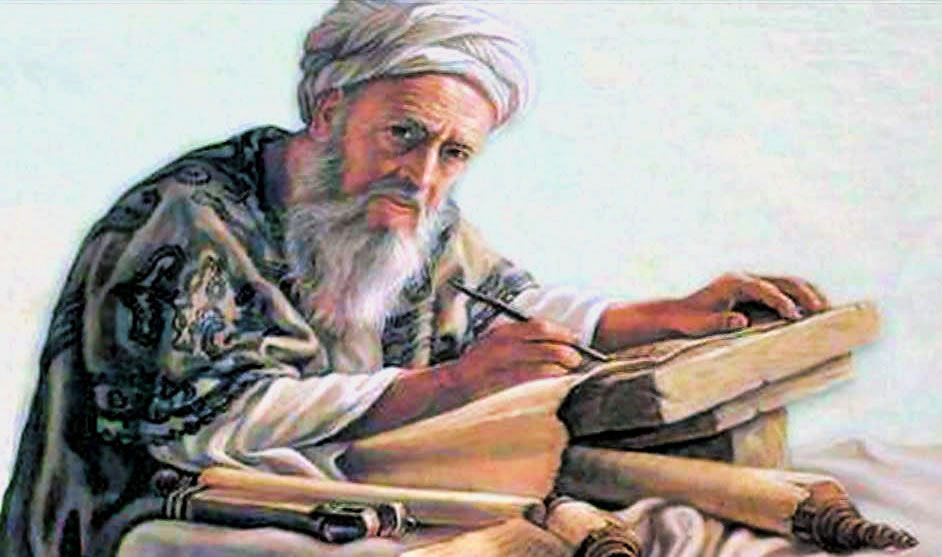
Text 359409: 04-Mar-94
Shyamasundara.ACBSP@com-link.org
Subject: Intermission
------------------------------------------------------------
Hare Krsna!
The following interesting anecdote from the life of Al-Biruni will serve as an intermission in our discussion of astrology and gems.
First a short introduction. Abu-Rayhan-Al-Biruni (born 987 AD) was a Muslim scientist and historian attached to the court of Mahmud of Ghazni, the ravager of India. Al-Biruni traveled to India and there studied Sanskrit and translated texts into Arabic and Persian. He studied the history of India and was especially interested in the Indian systems of astronomy and astrology. The most famous of his many books, Kitab-Al-Hind, has been translated by Sachua as Al-Biruni’s India. This book shows the Muslim scholar’s view point of India. It is not exactly un-partisan.
Aside from that, Al-Biruni was a highly learned man for his time and supported himself by his knowledge of astrology for which he was highly esteemed. Many great Muslim princes and pretenders to the Caliphate sought his advice. As we shall see from the following adventure it behooves one to follow Canakya Pandit’s advice about only living in a country where Brahmins are respected.
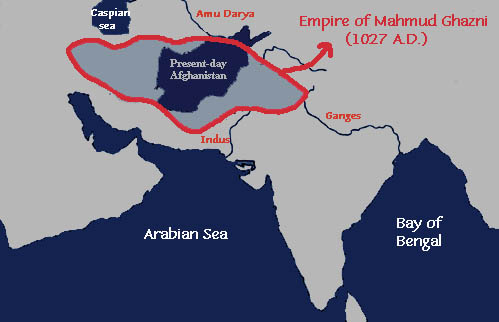
And now our little story:
One day, Sultan Mahmud of Ghazni, while seated in his four-domed summer house in the garden of a thousand trees, requested Al-Biruni to forecast, by his knowledge of the stars, which door the Sultan would leave the building. When Al-Biruni had complied with this command and had written his answers secretly on a piece of paper which he placed under a quilt, the Sultan caused a hole to be made in the eastern wall and through this he left the summer house.
-
You may also be interested in:
- Well, It’s a Crazy Story
- Ashtamangala Deva Prashna
- From the Astrologer’s Diary: The Night Dacoits Stole Srimati Radharani
- Life of Govinda Bhattathiri, ]yotisha Acarya
- Are There Different Sizes of Infinity?
Then he called for Al-Biruni’s prognostication and found to his disgust that it was written, “the king will go out by none of these four doors, but an opening will be made in the eastern wall through which he will leave the building.”
Sultan Mahmud, who had hoped to turn the laugh against Al-Biruni, was so angry that he ordered him to be cast down from the roof. Al-Biruni’s fall was, however, broken by a mosquito curtain; and on being brought again before the Sultan and asked whether he had foreseen this, he produced from his pocket a notebook in which it was written, under that date: “Today I shall be cast down from a high place, but reach the earth safely, and arise in a sound body.” Thereupon the Sultan was even more upset and caused him to be confined to the citadel for six months.
Source: AM Jan 90, pg 33.
Subscribe to our mailing list. And get our intermittent newsletter and updates to this site.
While I can’t comment on how bonafide and true this incident is it certainly speaks for the reputation of Al-Biruni as an astrologer as well as the horrendous character of Mahmud of Ghazni. Mahmood’s notoriety, we should mention, lies in the fact that during his career as ruler of Ghazni (in Afghanistan) he lead seventeen highly destructive campaigns of rapine and pillaging into India. He had no desire to conquer India. His desire was to increase his war chest so that he could expand his dominions to the West into the Caliphate of Baghdad. For according to the dictates of Cicero: Nervos belli, pecuniam infinitam - “The sinews of war, unlimited money.” After this India was so weakened that when the next wave of Muslim invaders came she collapsed.
This incident also teaches an astrologer to avoid the service of ignoble persons. It is not that an astrologer should be a dependant person and do the bidding of any and everyone. Rather he should strive to live by the Brahminical code and avoid the life of a dog.
Your Servant
Shyamasundara Dasa
Text 359405: 05-Mar-94
Brahmananda.ACBSP@com-link.org
Subject: Intermission.
------------------------------------------------------------
Prabhu, thank you for the welcome. I enjoyed the piece about Al-Biruni. I never realized he was connected with Mahmud of Ghazni. Your source is AM; whats that?
One thing about Al-Biruni should have been mentioned, which is that his 10th century writings are used by empirical scholars as confirmation for the dating of the Puranas. He is one of the only sources for dating the Puranas, which he cataloged in his writings. Being a foreigner to India, his citation is considered objective and authoritative.
Mahmud of Ghazni must be remembered for one thing: the sacking of Mathura. Actually he raped it several times, but the first was the most destructive. There are accounts written by some of his lieutenants of the lurid details. Mathura of that time was incredibly opulent, in fact one of the most affluent cities of the world, and much different from the Mathura of today. The temple erected at the Janmasthana was described to have taken a century to construct. More than half a dozen solid gold Deities were taken from this temple, as well as treasure houses full of jewels. Wagon loads of solid silver Deities came from the hundreds of surrounding temples. The marauding armies spent weeks in around-the-clock melting down all the Deities until they were exhausted from the hard work. They then left the city with wagon trains of brocades, carpets, and decorations; and still there were so much left behind.
Everything was carted back to Mahmud’s beloved capital city, which he developed into a splendorous place. A few years later the Huns swept through Ghazni, destroying all traces of it, so that now its location can hardly be found in any history book.
I have always wanted to write an article about this for BTG. Anyway, now you know the rest of the story....
Text 359431: 05-Mar-94
Shyamasundara.ACBSP@com-link.org
Subject: Answer to Brahmananda Prabhu
------------------------------------------------------------
Hare Krsna!
AM stands for Astrological Magazine (what else). The article Al-Biruni on Hindu Astrology by A. Sharaf, is actually a reprint from the A.M. February, 1962 issue. The author cites as references: Kitab-Al-Tafhim, Kitab-Al-Hind, and Al-Biruni on Transits, all books by Al-Biruni and published by American University of Beirut.
I have personally read through parts of his work better known as Al-Biruni’s India, translated by Sachua in the previous century [19th]. Al-Biruni definitely had typical fanatical Muslim ideas about India. His writings are indeed used by academic scholars as one of their main sources for re-creating Indian history. Cunningham and others have used him as the authority for establishing when the Gupta-kala and various other sakas [calendric epochs] occurred in terms of the Christian era.
The academic scholars prefer to re-create Indian history based on the notes of visitors to India like Al-Biruni, Megasthenes, Fu Hsien (Chinese Buddhist monk), and others, rather than accept the native historical documents. They denigrate the Puranas and other texts such as Rajatarangini of Kashmir, or Kali Yuga Raja Vrttanta of the Bhavisya Purana. By-passing native literature, of course, allows them to practice their scholarship and achieve their nefarious plans of subjugating India by psychological warfare. The British Imperialists and other Western scholars have done more damage to Vedic culture in the last 200 years than the previous 800 years of Muslim domination.
I didn’t see any reference in his works (Al-Biruni) where he cataloged the Puranas but then again, I was looking for other data and didn’t read it cover to cover.
One thing I seem to remember from Al-Biruni’s India (it may have been another book) was that in the biographical sketch it mentions that he was not on good terms with Mahmud of Ghazni. It seems that Mahmud was not on good terms with many people. He commissioned Al-Biruni to do some literary work for him and then didn’t pay him etc. He did this to several others including the celebrated poet Ferdowsi who was commissioned to write the Shah-nama (eulogizing biography) of Mahmood. However Ferishta was able to get revenge by writing many unflattering poems about Mahmud; from the safety of another kingdom, of course.
Why not write a BTG article on the sack of Mathura (and Dvaraka, etc.)? It would be very educational.
Your Servant
Shyamasundara Dasa
Further Reading
Mahmud Ghazni’s Invasions of India
The History of Sultan Mahmud of Ghazni
